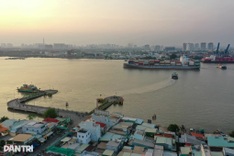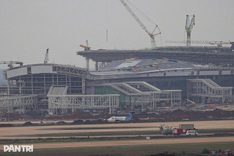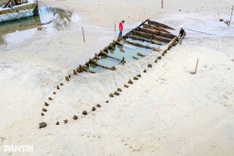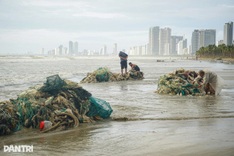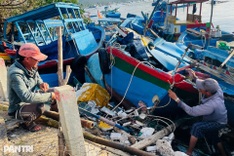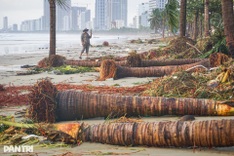Nguyen Chinh Tam, the writer of a series of three analyses “Seeking a new order in the East Sea”, to make clear his idea of institutionalising the East Sea disputes, in order to seek a reasonable and fair solution.

In your articles, you suggested that the East Sea disputes need to be “institutionalised”. Could you further make clear this concept?
Institutionalisation can be simply understood as using laws and regulations to rule and control behaviors. A region which is ruled by law or interaction between values, in theory, will be more orderly because relations between members in the community can be identified by anticipated signs. It’s like the role of traffic lights at a crossroad or road signal boards at public sites. In that environment, people will have to partly abandon force to treat each other by law and institutions. This is a benefit for smaller and weaker countries.
But in fact, international politics has been the game of strength and superpowers. Is that suggestion of “institutionalisation” impracticable?
It depends on your views. I agree that strength is the important factor in international politics but it is not the only factor.
Observing the situation in East Asia in recent years, we can see two tendencies of development. The first is institutions with the formation of regional organizations like ASEAN + 3, Chiang Mai Initiative and ASEAN-China Free Trade Agreement. The second is the rise of strength through the rising of China.
If only strength is highlighted, smaller and weaker countries in the region has the following choices. They can hail the big country, hoping that it will keep the leadership role to share common security and interests. The second path is seeking counterpoises outside the region to assure that their security and interest will not be threatened by the big country. Internal balancing by purchasing weapons, warships or outside balancing by setting up military alliances.
If they attach importance to strength, countries will make dialogues by warships. With a hammer, everything will be solved like a nail. But it is obvious that not everything is a rusty nail.
Therefore, in my articles, I do not completely deny strength and choose politic strength. I only argue that strength is not the target but the tool for the region to go to the ultimate point – an order ruled by law, in which law and institutions are standards for behaviors.
How can we ensure that big countries accept “institutionalisation” when they take advantage of power?
I think there is no absolute answer for this question. In principle, strong countries have three reasons to accept restricting themselves in the game of institutionalisation.
Firstly, to be in anticipation of their power decreases; creating a priority position in the institution will help them ensure their minimal interests, which does not depend on the index of strength.
Secondly, in an order that always use force to solve matters, the cost is very high. Is it possible to use nuclear weapon, torpedoes or warship in any conflict? Where is trade, finance and investment?
Law in the eyes of big countries is the measure to help them implement their interests with quite optimal cost, satisfying groups of interest that are enjoying from trade exchange.
Thirdly, the basic principle that all politicians understand is: power need legitimacy. Lack of legitimacy in behaviors, power is only violence and it is no longer just. Law and institution help big countries to pursue their leadership over other countries legitimately. Correct cause and strong words.
Do these reasons exist in the case of China?
China is a rising power (both economics and military). On one hand, China wants to create a new order to deal with its disadvantages in the old order. On the other hand, the process to build a new order must benefit China but it must not be costly. Particularly, it must avoid the risky military game against fleets of stronger countries.
Research works on global naval potentials show that Chinese navy is rising but it is in the last group of marine powers, which includes Japan or South Korea.
China needs law to play with strong countries, to ensure that it does not need to solve matters by force, which is costly.
The East Sea and disputes are not only the game between China, the strong country, and weaker countries – ASEAN. This game involves many parties and is divided into layers. The superpower USA, which is declining relatively, needs law to ensure its influence. The second powers like Japan, South Korea or Australia benefit from a stable order and they tend to support solving disputes multilaterally. The answer belongs to China.
It is important that we should not see Beijing as a united body with a consistent policy but should analyze each group of power or group of interests with various views and approach methods. In that angle, an institution-appreciating policy is one of the choices. But which motive-force from outside that can make that trend to become the major trend in Beijing’s policy making process.
In such a context, what should Vietnam and ASEAN do?
The two most important weapons of small countries in the East Sea disputes are multilateralism and international opinion.
In my articles, I repeated the idea of establishing inner-block agreement on a binding code of conduct of parties in the East Sea and making consensus of the different deductions of countries about the UN Convention on the Law of the Sea 1982 (UNCLOS).
In addition, the third party in solving disputes is necessary. The mechanism to create community security through ASEAN’s guidance, under the support of USA and its alliance can be the first step for the itinerary to set up a new order in the East Sea.
Moreover, in a community that respects law, public opinion is also an executive body. The presence of strength in this context comes from morals and law, which is showed clearly through the voice of support and protest against acts that are contrary to common values. One of these is protesting the use of force to solve disputes as well as sovereignty infringement.
People to people diplomacy was very important in the Vietnam War. In the 21st century, it is also the echo of common sense to unite man’s heart. One of urgent tasks at present is seeking the more reasonableness of reasoning. This is not the mission of policy makers and scholars but the responsibility of each Vietnamese.
What do you imagine the solution for the East Sea disputes in the future?
I’m not an unfoundedly optimistic person but I believe that law is the tendency of a civilized society. Directed toward peace and prosperity, disputes in the East Sea must be settled under law. As President Ho Chi Minh said: the East Sea needs to have “god of jurisdiction”!







